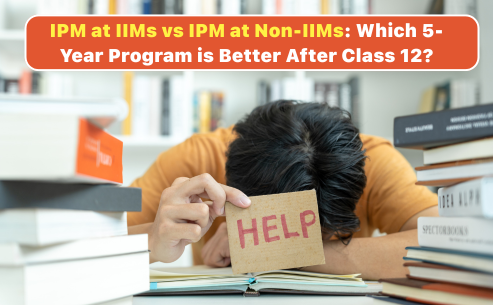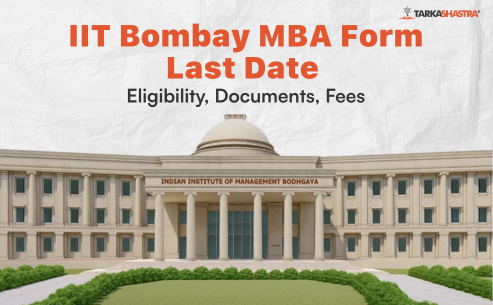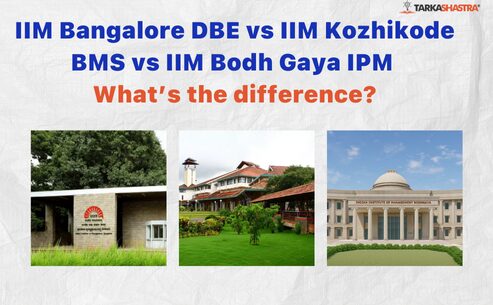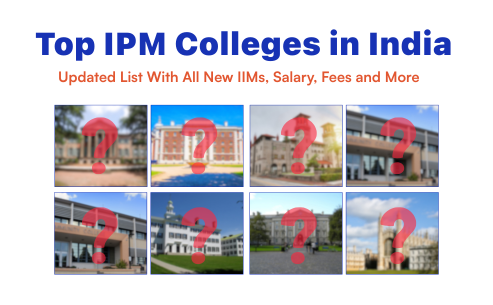In the last decade, Integrated Programs in Management (IPM) have emerged as one of the most sought-after pathways for students completing their Class 12.
Traditionally, students aspiring for management careers would first pursue a BBA, B.Com, or BMS degree and later prepare for competitive MBA entrance exams such as CAT, XAT, or NMAT. However, with the introduction of IPM by the Indian Institutes of Management (IIMs), the world of management education in India has significantly transformed.
Today, the question is no longer “Should I do management after graduation?” but rather “Which is better after Class 12 – IPM at IIMs or IPM at Non-IIMs?”
Both IIMs and reputed Non-IIM institutions now offer 5-year integrated management programs. These courses combine undergraduate (UG) learning with postgraduate (MBA) training, creating a seamless pathway for students who want to build strong foundations early. Yet, the programs differ vastly in terms of brand value, curriculum design, entrance exam competition, placements, fees, and career outcomes.
This blog provides a comprehensive, side-by-side comparison of IPM programs at IIMs and Non-IIMs, enabling you to make an informed decision about your career after Class 12.
Quick Snapshot – Why Students Choose IPM After Class 12
| Factor | Why It Attracts Students |
| Direct MBA Route | No need to prepare separately for CAT/XAT after graduation. |
| Early Start | Exposure to economics, management, and business skills from Class 12 onwards. |
| Brand Advantage | IPM from IIMs offers automatic prestige and recruiter recognition. |
| Structured Learning | Well-planned 5-year curriculum combining UG + MBA. |
| Placement Edge | Access to MBA-level placements at a young age (21–22 years). |
With this foundation set, we will now explore what IPM actually is in the next section, before moving into the detailed IIM vs Non-IIM comparison.
What is IPM?
The Integrated Program in Management (IPM) is a 5-year dual-degree program that combines undergraduate (UG) and postgraduate (MBA) studies in management. It was first introduced by IIM Indore in 2011, becoming the pioneer of this unique education model in India.
The program has since been adopted by several other IIMs and even some non-IIM institutions, given its rising popularity among Class 12 graduates.
Structure of IPM
The program is broadly divided into two phases:
| Phase | Duration | Focus Areas | Outcome |
| Foundation Phase (UG Years 1–3) | 3 Years | Economics, Mathematics, Statistics, Humanities, Business Fundamentals, Communication, Psychology | Builds analytical, quantitative, and soft skills essential for managers. |
| Management Phase (PG Years 4–5) | 2 Years | MBA-level curriculum including Finance, Marketing, HR, Strategy, Operations, Consulting | Awarded MBA/PGP degree with access to top corporate placements. |
Why IPM Stands Out
- Seamless Pathway to MBA: Unlike traditional BBA or B.Com courses, IPM ensures students do not need to reappear for competitive exams like CAT to pursue an MBA.
- Holistic Learning: Focus not only on management but also on liberal arts, social sciences, and quantitative subjects.
- Early Advantage: Students start their MBA journey right after Class 12, giving them a head start in career-building.
- Corporate Demand: Recruiters increasingly value IPM graduates for their maturity, multi-disciplinary knowledge, and strong analytical skills.
IPM at IIMs: An Overview
The Indian Institutes of Management (IIMs) are India’s premier management institutes, known globally for producing some of the finest business leaders, consultants, and policymakers. The launch of IPM by IIM Indore in 2011 marked a new era — offering Class 12 students a direct pathway into the IIM ecosystem without waiting for CAT after graduation.
Today, seven IIMs offer the IPM program: IIM Indore, IIM Rohtak, IIM Ranchi, IIM Bodh Gaya, IIM Jammu, IIM Amritsar, and IIM Shillong. Each institute follows its own selection process, but all maintain the IIM-standard rigour and global recognition.
Key Features of IPM at IIMs
- Entrance Exams: IPMAT (Indore & Rohtak) and JIPMAT (Ranchi, Bodh Gaya, Jammu).
- Seat Intake: Typically ranges between 60 and 180 per campus.
- Curriculum: Blend of mathematics, economics, social sciences, and management subjects.
- Exit Option: Some IIMs allow exit after 3 years with a BBA/Bachelor’s degree.
- Placements: Students eventually join the MBA placement pool of the respective IIM, giving them access to top recruiters.
Table – IPM Programs at IIMs
| IIM | Entrance Exam | Approx. Seats | Degree Offered | Exit Option (After 3 Years) | Distinct Features | Placement Advantage |
| IIM Indore | IPMAT Indore | ~150 | BA (Foundations of Management) + MBA | Yes | Pioneer of IPM, international tie-ups, strong alumni base | Consistently among top IIM placements |
| IIM Rohtak | IPMAT Rohtak | ~198 | BBA + MBA | Yes | Large intake, law & entrepreneurship electives, growing brand | Strong in consulting & corporate roles |
| IIM Ranchi | JIPMAT | ~120 | BBA + MBA | Yes | Shared faculty with MBA program, strong eastern India presence | Steady growth, backed by IIM name |
| IIM Bodh Gaya | JIPMAT | ~120 | BBA + MBA | Yes | Emerging IIM, early global collaborations, govt. support | Expanding placement opportunities |
| IIM Jammu | JIPMAT | ~140 | BBA + MBA | Yes | Strategic location, fast-growing infrastructure, industry tie-ups | Developing placement ecosystem |
| IIM Amritsar | IPMAT Indore | ~60 | BSQFE (Bachelor of Science in Quantitative Finance and Economics) + MBA | Yes | New IPM entrant, leverages IPMAT–Indore + PI, access to Punjab’s corporate network | Growing placement links, benefits from rising IIM Amritsar MBA reputation |
| IIM Shillong | IPMAT Indore | ~45 | BBA + MBA | Yes | Strong focus on sustainability and ethics, integration with Shillong’s MBA culture | Advantage of IIM Shillong MBA placements; niche focus on CSR & sustainable roles |
Why Students Prefer IPM at IIMs
- Brand Value: The “IIM tag” is globally recognised.
- Peer Group: Admission is highly competitive, ensuring quality peer learning.
- Placements: Access to the same corporate opportunities as flagship MBA students.
- Alumni Network: Connects students with IIM graduates in top global firms.
- Long-Term ROI: Though expensive (~₹30–40 lakhs for 5 years), the returns are usually justified by high placement packages.
IPM at Non-IIMs: An Overview
While IIMs pioneered the Integrated Program in Management, several reputed non-IIM universities and private institutes have also introduced similar 5-year management programs. These are designed to blend undergraduate business education with postgraduate management training, often modelled on the IPM structure.
Unlike IIMs, most non-IIM institutions use their own entrance exams or national-level tests like NPAT or CUET for admissions. Many programs also offer an exit option after 3 years, allowing students to graduate with a BBA or equivalent degree and then decide whether to continue into the MBA phase.
Why Students Consider Non-IIM IPMs
- Accessibility: Entrance exams are comparatively less competitive than IPMAT/JIPMAT.
- Affordability: Total fees are usually lower than those at IIMs, making them attractive for middle-income families.
- Flexibility: Exit options allow students to switch paths after 3 years.
- Regional Strengths: Some institutes enjoy strong regional corporate connections (Mumbai, Pune, Bangalore, Ahmedabad, etc.).
- Diversity of Courses: Specialisations like Finance, Marketing, Analytics, and International Business are often available.
Popular Non-IIM IPM/Integrated BBA-MBA Programs
| Institute | Entrance Exam | Approx. Seats | Degree Offered | Exit Option (After 3 Years) | Distinct Features | Placement Advantage |
| NMIMS (Mumbai & Campuses) | NPAT | ~60 | BBA / BBA+MBA | Yes | Strong corporate tie-ups, industry-oriented curriculum, multiple campuses | High placements in Mumbai; strong corporate presence |
| Nirma University (Ahmedabad) | IPMAT Indore | ~240 | BBA-MBA Integrated | Yes | Industry-aligned UG + MBA, strong Gujarat network | Strong local placements in manufacturing & services |
| TAPMI (Manipal) | IPMAT Indore/JIPMAT/JEE Mains/MET etc | ~60 | BBA (Honors) + MBA | Yes | Known for MBA pedigree, expanding UG base | Growing placement reputation |
| Christ University (Bangalore) | CUET | ~500 | BBA + MBA Pathway | Yes | South India’s top private B-school; wide elective choices | Strong regional industry connect, internships focus |
| IIFT Kakinada | IPMAT Indore | ~40 to 60 | BBA + MBA | Yes | Early specialisation in International Business; strong brand legacy of IIFT. | Excellent corporate tie-ups in trade, logistics, and consulting. |
| NALSAR University (Hyderabad) | IPMAT Indore/NMET | ~66 | BBA + MBA | Yes | Unique law + management exposure; interdisciplinary curriculum. | Placement support through NALSAR’s legal + corporate networks. |
Key Takeaways
- Non-IIM programs may not carry the same global brand weight as IIMs, but they often provide solid industry exposure, affordability, and flexibility.
- They are excellent options for students seeking a balanced mix of academics and industry orientation, free from the high-pressure competition of IIM entrances.
Key Comparison Parameters: IIMs vs Non-IIMs
Choosing between an IPM at IIMs and an IPM at Non-IIMs requires a close look at critical factors that shape your academic journey and career outcomes. Below is a detailed side-by-side comparison to help you evaluate both options.
Table – IPM at IIMs vs IPM at Non-IIMs
| Parameter | IPM at IIMs | IPM at Non-IIMs |
| Brand Value | Globally recognized “IIM” tag; strong alumni and recruiter network. | Regional or private brand recognition; varies by institute (e.g., NMIMS, Symbiosis have strong reputations in metros). |
| Entrance Exam & Competition | Highly competitive (IPMAT Indore/Rohtak, JIPMAT). Selection rate <1–2%. | Comparatively less competitive (NPAT, SET, CUET, institute-level exams). Higher chances of selection. |
| Peer Group | PAN-India toppers; academically strong, competitive environment. | Wider range of academic profiles; diversity is high, but overall average competitiveness is lower. |
| Curriculum & Pedagogy | Structured 3+2 model with strong focus on quant, economics, humanities, and MBA rigor. Research-driven with international collaborations. | Industry-aligned programs; more electives and flexibility. Some focus on entrepreneurship and sectoral specialization. |
| Placements | Access to flagship MBA placements of IIMs (consulting, finance, product management, strategy). Average packages ₹18–30 LPA (top IIMs). | Regionally strong placements in FMCG, IT, BFSI, retail, and startups. Average packages ₹6–12 LPA (depending on institute). |
| Exit Option (After 3 Years) | Available at most IIMs (degree like BA Foundations of Management, BBA, BSQFE, etc.). | Widely available; many students exit with a BBA and prepare for MBA separately. |
| Cost & ROI | Fees: ~₹30–40 lakhs for 5 years. High ROI due to premium placements. | Fees: ~₹15–25 lakhs for 5 years. ROI moderate; depends on institute and placement strength. |
| Alumni Network | Extensive, global, and influential. | Regionally strong, varies widely by institute. |
| Learning Environment | Rigorous, academically challenging, with highly competitive peers. | Balanced; often more student-friendly with extracurricular flexibility. |
Key Insights
- If you’re looking for global brand recognition, top corporate placements, and long-term ROI, then IIM IPMs are unmatched.
- If your priorities are affordability, easier entry, and regional corporate exposure, then Non-IIM IPMs can be the practical choice.
- Both categories allow early entry into management studies, but the IIM tag provides a stronger launchpad in the corporate world.
Who Should Choose IIMs’ IPM?
The IPM programs at IIMs are considered the gold standard for management education right after Class 12. However, they are not meant for everyone. Admission is highly competitive, and the program requires a strong commitment to academic rigour. Below are the types of students who are best suited for an IIM IPM pathway:
1. Students Strong in Aptitude & Academics
- The entrance exams (IPMAT Indore, IPMAT Rohtak, JIPMAT) have a high level of quantitative aptitude and verbal ability questions.
- Students with a solid foundation in mathematics, reasoning, and English comprehension stand a higher chance of cracking these exams.
2. Aspirants Targeting Top-Tier Corporate Roles
- IPM at IIMs provides direct access to consulting, finance, strategy, and product management roles with global companies.
- If your dream is to work with firms like McKinsey, BCG, Bain, Goldman Sachs, Amazon, or Google, IIMs are the most reliable launchpad.
3. Students Willing to Invest in High Cost for Good ROI
- The fees (~₹30–40 lakhs for 5 years) may appear steep, but the return on investment through top placements justifies it.
- Students from families willing to make this investment will benefit from the long-term career returns.
4. Competitive & Ambitious Individuals
- Peer groups at IIMs are some of the most competitive in India.
- Students who thrive in high-pressure, challenging environments and want to push their limits will feel at home in IIM IPMs.
5. Aspirants Seeking Global Exposure & Brand Value
- IIMs enjoy global recognition and strong international exchange tie-ups.
- Students aspiring for global careers or higher studies abroad will gain a significant advantage with the IIM brand name on their profile.
In short, choose IIM IPM if you are academically strong, ambitious, and ready to handle rigour while aiming for prestigious corporate roles and global exposure.
Who Should Choose Non-IIMs’ IPM?
While IIM IPMs hold a premium position, Non-IIM IPM programs (like those at NMIMS, Symbiosis, Nirma, Christ, TAPMI, IIFT Kakinada, and NALSAR) also cater to a large pool of students. These programs are ideal for those who want a strong foundation in management without the intense competition and higher cost of IIMs.
1. Students Looking for Affordable Management Education
- Non-IIM IPM programs typically cost between ₹15–25 lakhs for 5 years, making them more affordable than IIMs.
- Families seeking quality education at a lower investment will find these programs attractive.
2. Aspirants Who Prefer Moderate Competition
- Entrance exams like NPAT, SET, CUET, or institute-level tests are less competitive compared to IPMAT/JIPMAT.
- Students who may not be confident about high-level quant-heavy exams can still secure a good program.
3. Students Interested in Regional Placement Strengths
- Institutes like NMIMS (Mumbai), Symbiosis (Pune), or Christ (Bangalore) have excellent regional industry connections.
- Students aiming to work in specific locations or industries (such as IT in Bangalore, Finance in Mumbai, or FMCG in Pune) benefit from these networks.
4. Learners Who Value Flexibility & Exit Options
- Many non-IIMs offer an exit option after 3 years with a BBA degree.
- This is helpful for students who may later want to prepare for CAT, GMAT, or explore other fields after UG.
5. Students Seeking Diverse Specialisations Early
- Programs like IIFT’s focus on International Business or NALSAR’s unique Law + Management blend give Non-IIM IPMs an interdisciplinary edge.
- Students interested in niche career paths can benefit more from these offerings.
In short, Non-IIM IPMs are best for students who want affordability, moderate entry competition, regional corporate exposure, and flexibility with the option to switch paths after UG.
Career Scope After IIM IPM vs Non-IIM IPM
The ultimate question for students and parents is: “What kind of career opportunities do these programs unlock?” Both IIM and Non-IIM IPM graduates enter the corporate world earlier than traditional MBA aspirants, but the scale and scope differ significantly.
Career Outcomes: IPM at IIMs
- Premium Roles Across Industries
- Consulting: McKinsey, BCG, Bain, Deloitte, Accenture Strategy.
- Finance: Goldman Sachs, JP Morgan, HDFC Bank, ICICI Bank.
- Technology & Product: Amazon, Microsoft, Google, Flipkart, Paytm.
- FMCG & Retail: HUL, ITC, P&G, Nestlé.
- Average Packages (MBA Phase): ₹18–30 LPA at top IIMs (Indore/Rohtak).
- Long-Term Edge: Faster access to CXO-level roles through the IIM alum network and brand advantage.
- International Opportunities: Many IPM grads pursue global MBA/MS degrees or international roles through IIMs’ partnerships.
Career Outcomes: IPM at Non-IIMs
- Strong Regional & Sectoral Placements
- NMIMS: Finance, BFSI, and consulting in Mumbai.
- Symbiosis: Marketing, sales, and corporate strategy in Pune & NCR.
- Christ: IT, HR, and retail placements in Bangalore.
- IIFT Kakinada: Specialised roles in International Trade, Logistics, and Consulting.
- NALSAR: Unique Law + Management roles in corporates and policy sectors.
- Average Packages: ₹6–12 LPA depending on institute and location.
- Niche Roles: International Business, Legal-Management hybrids, and regionally strong industries.
- Higher Education Pathways: Many graduates opt to exit after BBA and pursue CAT/GMAT for IIM MBA or global programs.
Comparison Snapshot
| Aspect | IPM at IIMs | IPM at Non-IIMs |
| Top Recruiters | MBB Consulting, Goldman Sachs, Amazon, HUL, Microsoft | Deloitte, KPMG, Infosys, ICICI, regional MNCs & startups |
| Average Package | ₹18–30 LPA (MBA phase) | ₹6–12 LPA |
| Career Tracks | Consulting, Finance, Product Management, Strategy | Sales, Marketing, Operations, International Business, Legal-Management |
| Global Exposure | High – global tie-ups and alumni network | Moderate – depends on institute |
| Long-Term Growth | Faster CXO track, strong alumni pull | Steady growth, often requires additional MBA/global degree |
In summary:
- IIM IPM graduates enjoy premium corporate roles and higher average salaries, with unmatched long-term career acceleration.
- Non-IIM IPM graduates often secure good regional roles and can strengthen their profiles through further study or by leveraging niche specialisations.
Expert Insights: Is Brand Value Everything?
One of the biggest dilemmas students face is whether the IIM brand is worth the extra cost, effort, and competition compared to non-IIM IPM programs. While the “IIM tag” undeniably carries enormous weight, brand value alone should not dictate your choice.
1. The Power of the IIM Brand
- The IIMs enjoy global recognition and carry prestige in both corporate and academic circles.
- Recruiters often use the IIM brand as a filter during hiring, particularly in consulting and finance.
- Alums from IIMs dominate leadership positions across industries, creating a strong pull for current graduates.
2. Why Skills and Profile Still Matter
- Recruiters are increasingly focusing on skills, internships, and problem-solving ability rather than just the name of the institute.
- A student from a non-IIM with excellent internships, certifications, and networking can compete with an IIM graduate for many roles.
- Employers want job-ready professionals, which requires more than just classroom learning.
3. Long-Term Perspective
- In the first few years, the brand plays a crucial role in opening doors.
- Beyond mid-career levels, performance, networking, and skills become far more important than the degree label.
- Many Non-IIM graduates who pursue further studies (like IIM MBA via CAT/GMAT or global MBAs) catch up with IIM IPM peers over time.
4. When the Brand is Critical
- If your goal is consulting, investment banking, or product management at global firms, the IIM advantage is unmatched.
- For students wanting to pursue global higher education, the IIM name strengthens applications significantly.
5. When Skills Can Outweigh Brand
- For careers in entrepreneurship, family business, marketing, or tech startups, the skills, adaptability, and industry experience you gain may outweigh the brand name.
- Students from Non-IIMs who consistently upskill (analytics, digital marketing, CFA, coding, etc.) can achieve equally successful outcomes.
In short:
The IIM brand accelerates early opportunities and provides a global network, but long-term success depends on skills, adaptability, and consistent learning. Students should weigh brand vs personal fit carefully before deciding.
Conclusion: Which is Better After Class 12?
The choice between IPM at IIMs and IPM at Non-IIMs ultimately depends on your career goals, financial investment capacity, and academic strengths. Both pathways open the door to early management education, but they serve different types of students.
Choose IIM IPM if:
- You are academically strong, ambitious, and ready to handle rigorous competition. The IIM brand ensures premium placements, global exposure, and faster long-term growth. It is best suited for students aspiring to careers in consulting, finance, strategy, and leadership roles.
Choose Non-IIM IPM if:
- You seek affordable management education with good regional corporate connections, diverse specialisations, and an easier entry pathway. Non-IIM programs provide a balanced mix of academics and industry exposure, and they offer the flexibility to exit after 3 years for higher studies or other opportunities.
Final Word
There is no one-size-fits-all answer. The IIM IPM is undoubtedly the gold standard, but non-IIM IPMs are also creating strong outcomes for students who know how to leverage internships, skill-building, and networking.
At Tarkashastra, we mentor students for both IIM and Non-IIM IPM entrances like IPMAT, JIPMAT, NPAT, SET, and CUET. With structured guidance, mock tests, and mentor-driven strategies, we help aspirants choose the best-fit path after Class 12 and prepare them to excel in whichever program they pursue.
Whichever path you choose, success will depend less on the institute’s name and more on how you utilize the opportunities, build your profile, and grow continuously.
FAQs
1. What is the difference between IPM at IIMs and IPM at Non-IIMs?
IPM at IIMs offers the prestigious IIM brand, tougher entrance exams, higher fees, and premium placements. Non-IIM IPMs are more affordable, less competitive to enter, and provide strong regional opportunities.
2. Which IIMs currently offer the IPM program?
Seven IIMs offer IPM: IIM Indore, IIM Rohtak, IIM Ranchi, IIM Bodh Gaya, IIM Jammu, IIM Amritsar, and IIM Shillong.
3. What entrance exams are required for IPM?
IIM Indore, Amritsar, and Shillong accept IPMAT–Indore; IIM Rohtak has its own IPMAT; IIM Ranchi, Bodh Gaya, and Jammu accept JIPMAT. Non-IIMs use NPAT, SET, CUET, or their own tests.
4. What is the fee structure for IIM IPM programs?
The total fee for 5 years is typically ₹30–40 lakhs, depending on the campus.
5. Are Non-IIM IPMs more affordable?
Yes, most Non-IIM IPMs cost between ₹15–25 lakhs, making them more budget-friendly.
6. Do IPM programs allow exit after 3 years?
Yes, many IIMs and Non-IIMs allow students to exit after 3 years with a BBA or equivalent degree.
7. Which has better placements: IIM or Non-IIM IPM?
IIM IPMs provide access to flagship MBA placements with average packages of ₹18–30 LPA. Non-IIMs offer regional placements averaging ₹6–12 LPA.
8. Can I shift from a Non-IIM IPM to an IIM MBA later?
Yes, students can exit after their BBA and appear for CAT/GMAT to join IIM MBA programs.
9. What career roles do IIM IPM graduates get?
Graduates enter consulting, finance, product management, strategy, and global leadership roles with firms like McKinsey, BCG, Goldman Sachs, and Amazon.
10. What careers do Non-IIM IPM graduates pursue?
They often work in marketing, HR, operations, international business, and BFSI roles, with strong regional industry connections.
11. Is IPM better than a traditional BBA or B.Com?
Yes, IPM provides a seamless UG-to-MBA path, saving students from reappearing for CAT later, and offers early exposure to management learning.
12. Which program should I choose after Class 12: IIM or Non-IIM IPM?
If you’re looking for global recognition, premium placements, and the ability to handle tough competition, IIM IPM is the choice for you. If you prefer affordability, flexibility, and regional opportunities, Non-IIM IPMs are a practical choice.







